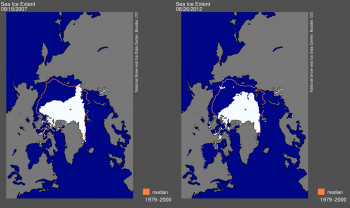Arctic Sea Ice at Record Low
Thursday, August 30th, 2012August 30, 2012
The extent of the Arctic icecap fell to a record low on August 26, reported scientists with the National Snow and Ice Data Center (NSIDC) in Boulder, Colorado. The icecap was measured at 1.58 million square miles (4.1 million square kilometers), below the previous record of 1.61 million square miles (4.17 million square kilometers) set on Sept. 18, 2007, and the lowest level since satellite measurements began in 1979. NSIDC scientists noted that the icecap normally reaches it lowest point only in mid-September of each year, so there is a possibility that the sea ice may melt even more. The icecap grows larger during the cold Arctic winter, reaching about 6 million square miles (15.5 square kilometers).

The extent of Arctic sea ice fell on Aug. 26, 2012 (right), to 1.58 million square miles (4.1 million square kilometers), lower than the previous record low of 1.61 million square miles (4.17 million square kilometers) on Sept. 18, 2007. (National Snow and Ice Data Center)
NSIDC scientists also reported that the thickness of the icecap is diminishing. Submarine measurements indicate that the Arctic icecap has lost 40 percent of its thickness since the 1980′s. Between the loss of area and thickness, the summer ice volume in the Arctic in the 2000′s is only about 30 percent of its volume in the 1980′s. Of the finding, Peter Wadhams of Cambridge University in the United Kingdom said, “This means an inevitable death for the ice cover, because the summer retreat is now accelerated by the fact that the huge areas of open water already generated allow storms to generate big waves which break up the remaining ice and accelerate its melt.”
Scientists commenting on the findings linked the low ice levels to rising global temperatures. According to NSIDC scientist Ted Scambos, “We’re in a declining trend because the Earth is getting warmer. … It’s going to continue to be a series of shrinking ice extents year by year. … We’re not going back.” Climate scientists believe that the warming is mainly a result of human activity. The ice affects climate and weather conditions far beyond the North Pole.
Additional World Book articles:
- What We Know About Global Warming (A Special Report)
- The Great Meltdown (Special Report)
- Global warming (2007) (a Back in Time article)


